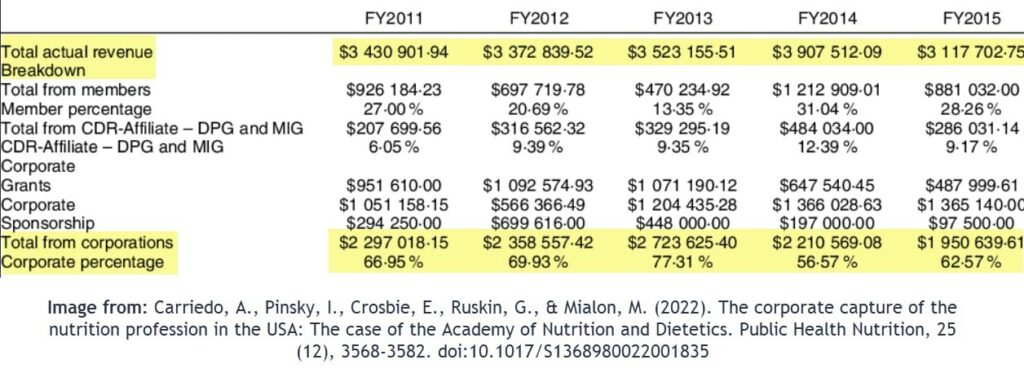When Nutritional Leaders are on the Take, Who Can We Trust?
Many with celiac and gluten sensitivity seek out nutritional experts for guidance on their health journey. Recent research brings to light the conflict of interests that many of these experts have. If you looking for nutritional advice, beware.
The Academy of Nutrition and Dietetics (AND) is the largest organization of food and nutrition professionals in the United States with approximately 112,000 members. It is responsible for setting standards for nutrition education, research, and practice, and for promoting the role of nutrition in public health. However, the AND has come under criticism in recent years for accepting corporate donations from junk food companies.
These donations create a huge conflict of interest for the AND and erode consumer trust when it comes to nutritional policy in the US. When an organization receives funding from junk food companies, it may be more inclined to support policies that are favorable to those companies, even if they are not in the best interest of public health. This can undermine the credibility of the AND as a reliable source of nutrition information and advice.
Donations or Bribes? You Can Judge for Yourself
One example of this conflict of interest is the AND’s partnership with the Coca-Cola Company. In 2015, the AND accepted a grant of over $500,000 from Coca-Cola to fund a nutrition education program. However, Coca-Cola’s products, such as sugary sodas and sports drinks, have been linked to
obesity and other health problems.
AND has also accepted funding from the Sugar Association, which represents the interests of the sugar industry. The AND has received over $250,000 from the Sugar Association since 2009. While the AND has defended these donations, saying that they are used for education and research purposes, one would have to be very naïve indeed to believe that such funding has zero influence on policy and decision making.
There are several other examples of the AND accepting corporate donations from companies entrenched in producing less than healthy foods. These donations should give us all serious cause for concern.
One example is the AND’s relationship with the snack food company, Mondelez International. The AND has accepted multiple donations from Mondelez, which owns brands such as Chips Ahoy, Ritz, and Trident gum. Many of these products are high in sugar, salt, and unhealthy fats, and have been linked to obesity and other health problems.
Another example is the AND’s partnership with the fast food chain, McDonald’s. The AND has accepted multiple donations from McDonald’s, including a $1 million grant in 2016 to fund a nutrition education program. It’s no mystery that McDonald’s food is not promoting of good health. This was highlighted in the documentary film,
Super Size Me, when Morgan Spurlock developed fatty liver damage, high blood pressure, depression, and obesity as a result of eating only McDonald’s food for 30 days.
In 2016, after taking money from Kraft, the ADN allowed their trademarked “Kids Eat Right” logo to be placed on the
highly processed cheese product. If you know anything about Kraft Singles, you know that it isn’t something you want your kids eating.
The Academy of Nutrition and Dietetics has also accepted corporate donations from other junk food companies, such as Nestle, PepsiCo, and ConAgra Foods. These companies produce sugar laden, ultra processed, GMO based foods that have been associated with
heart disease, to obesity,
autoimmunity, and
chronic degenerative diseases.
If you break down the AND’s revenue (See image below), you can clearly see that the vast majority of it comes from corporate donations. In my experience, when you make your business dependent on donors, the donors typically call the shots behind the scenes. We see the
same trend with the pharmaceutical company influence over medical journals, academic institutions, politicians, doctors, medical schools, media, etc.

A
research paper published in the journal, Public Health & Nutrition had the following to say about AND:
Results:The AND, AND Foundation (ANDF) and its key leaders have ongoing interactions with corporations. These include AND’s leaders holding key positions in multinational food, pharmaceutical or agribusiness corporations, and AND accepting corporate financial contributions. We found the AND has invested funds in corporations such as Nestlé, PepsiCo and pharmaceutical companies, has discussed internal policies to fit industry needs and has had public positions favouring corporations.
Conclusion:The documents reveal a symbiotic relationship between the AND, its Foundation and corporations. Corporations assist the AND and ANDF with financial contributions. AND acts as a pro-industry voice in some policy venues, and with public positions that clash with AND’s mission to improve health globally.
It’s not rocket science. Money donations create relationships and undue influence. It the AND wants to be taken seriously and regain any credibility, they should turn down money from sponsors who represent the antithesis of good health and nutrition… but they won’t. They will most likely keep on taking the bribes, oops, I mean money. And in doing so, they will continue to erode their organizations credibility and trust with the public.
What Does Any of This Have to Do With a Gluten Free Diet?
Many embarking on a
gluten free diet to restore their health are turning to ultra processed foods produced by the very companies above. Patients typically see a dietician to direct them on dietary advice. If dieticians as a group, are under the financial influence of these companies, their advice could be compromised along with the health of the patients seeking to benefit from dietary counseling.
Several studies have been published that show celiac patients have a poorer outcome when consuming ultra processed foods.
Bottom line – Patients with celiac and gluten sensitivity need to be aware that the AND and it’s members are taking money from the very companies responsible for producing processed foods that could lead them toward a path of poorer health.

 A research paper published in the journal, Public Health & Nutrition had the following to say about AND:
Results:The AND, AND Foundation (ANDF) and its key leaders have ongoing interactions with corporations. These include AND’s leaders holding key positions in multinational food, pharmaceutical or agribusiness corporations, and AND accepting corporate financial contributions. We found the AND has invested funds in corporations such as Nestlé, PepsiCo and pharmaceutical companies, has discussed internal policies to fit industry needs and has had public positions favouring corporations.
Conclusion:The documents reveal a symbiotic relationship between the AND, its Foundation and corporations. Corporations assist the AND and ANDF with financial contributions. AND acts as a pro-industry voice in some policy venues, and with public positions that clash with AND’s mission to improve health globally.
It’s not rocket science. Money donations create relationships and undue influence. It the AND wants to be taken seriously and regain any credibility, they should turn down money from sponsors who represent the antithesis of good health and nutrition… but they won’t. They will most likely keep on taking the bribes, oops, I mean money. And in doing so, they will continue to erode their organizations credibility and trust with the public.
A research paper published in the journal, Public Health & Nutrition had the following to say about AND:
Results:The AND, AND Foundation (ANDF) and its key leaders have ongoing interactions with corporations. These include AND’s leaders holding key positions in multinational food, pharmaceutical or agribusiness corporations, and AND accepting corporate financial contributions. We found the AND has invested funds in corporations such as Nestlé, PepsiCo and pharmaceutical companies, has discussed internal policies to fit industry needs and has had public positions favouring corporations.
Conclusion:The documents reveal a symbiotic relationship between the AND, its Foundation and corporations. Corporations assist the AND and ANDF with financial contributions. AND acts as a pro-industry voice in some policy venues, and with public positions that clash with AND’s mission to improve health globally.
It’s not rocket science. Money donations create relationships and undue influence. It the AND wants to be taken seriously and regain any credibility, they should turn down money from sponsors who represent the antithesis of good health and nutrition… but they won’t. They will most likely keep on taking the bribes, oops, I mean money. And in doing so, they will continue to erode their organizations credibility and trust with the public.

4 Responses
Hello Dr. Osborne, I am a holistic nutritionist in a sea of RDs who are guided and educated according to the AND philosophy. It’s frustrating when clients decide it’s cheaper to switch from my services to their doctors RD on staff only bc insurance covers it, even though they improve under my guidance. While not all RDs are likeminded with the AND, many are. I am hoping to do my PhD dissertation on the effects of a wheat free diet on asthma signs and symptoms and one asthma researcher told me there is no connection and I should switch my topic. Shocking he said this bc there is NO published research to date examining the effects of wheat and asthma.
Thanks for chiming in Karen!
No connection indeed! Here is a comprehensive post with medical references attached on this connection and more. Can’t wait to see your PhD dissertation!
All the best,
Dr. O
It is very comprehensive documents that shows how these trusted foundations put their own interest above in the interest of patient and population at large. Also the scientific and technological elite steering the country for their own ends with odd of the nation interest. So saidEisenhower in his farewell speech.
Show one non political confrontational response to the supposed corruption in the medical nutritional industry sleeping with the food manufacturers are processed unhealthy foods is for gluten sensitivity and silly applications to eat the most basic foods that have been known to be gluten free. I’ll know that it’s theoretical and hard to do in this world because of the temptations flashed in our face every day for many things besides food especially food. Also from just some of the things you posted new research on zayn protein reactions found in other grains that were supposed to make gluten free producing gluten type reactions and people sensitive to gluten is difficult to Digest is well both physically and intellectual. Which means things we thought were healthy have been altered because of agricultural and production techniques perhaps. Getting too much into this will cause psychologic usually called psychosomatic symptoms of stress or frayed to eat anything. Increasing sympathetic Activity stress response fighting flights androme with increased quarters all and inflammatory damage from that process as well. So everything in moderation is my motto. Taking nutritional supplements. Studies to show that some condimentunlike Tumblr Rick and peppermint can reduce inflammation in the body including in the small intestines from gluten exposure. Also silly act reactions cause so many symptoms that are typical in other diseases will there be neurological compromise cognitive dysfunction, as well as a myriad of gastroin testinal symptoms that have been identified by their own. Like acid reflux Gerd senior dyspepsia, flatulence, and gas. Unfortunately the extreme reaction from some other people might be hacked wouldn’t miles won’t just enjoy myself while I’m still on this planet aint drink and be married for I know not what tomorrow brings. These are not normal reactions of course and should not pursue These are not normal sensible reactions of course and should not pursue but some due. I know one who does! Lol